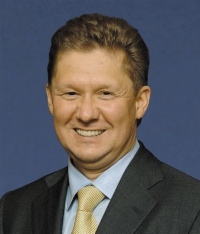NTV Channel
Interview by OAO Gazprom CEO Alexey Miller to the NTV channel, “Segodnya. Summary Program”.
Last week saw the announcement of the formation of a “big gas troika”: besides Russia it includes Iran and Qatar. And although this move was stated to be targeted at projects that are mutually beneficial for the three countries (exact project names will be disclosed in the near future), allegations have emerged in Europe and beyond the ocean that something like a “gas OPEC” is being created and this process is very harmful and fraught with monopolism.
But what is going on in reality? Will the present situation on the global raw material markets have an impact on Russia's gasification program? These questions have been addressed by the Summary Program to Gazprom CEO Alexey Miller.
Alexey Borisovich, a “big gas troika”... As far as I know, some of your negotiating partners associate it, let's say, if not with a Russian troika than at least with a horse team. Why should Russia get engaged in that?
-
You know, I think the association is actually quite right. If not with a Russian troika than at least with a horse team since we are talking about the countries, which are the world's leaders in terms of gas reserves.
Russia is a wheeler in this “troika” as it is number one worldwide in all of the following positions – reserves, production, exports and consumption.
Why does Russia need this? Nowadays we are witnessing the world gas market become increasingly global. Qualitatively new opportunities are emerging in trade and production. And this, of course, stimulates a dialogue between producers.
This dialogue results in the appearance of such informal alliances as a “big gas troika”. I am totally convinced that the dialogue between our three countries will serve the interests of all these three states.
What is the status of the “big gas troika”? And, as a matter of fact, is it a step towards establishing a “gas OPEC”?
I should set the consuming countries at ease. The “big troika” is an informal alliance. Naturally, it is a constant dialogue between Qatar, Iran and Russia. As for the status of the gas exporting countries, a lot has already been done by now so as to institutionalize the Forum at a November meeting in Moscow – to make it a permanent organization with its own charter and headquarters. A focus will certainly be placed on joint declarations of the organization's member countries.
But this is not a “gas OPEC” anyway. The emergence of the “big gas troika” as well as the emergence of the Gas Exporting Countries Forum as an organization are absolutely logical things that are driven by the gas business development logic. These are not someone's evil plans on how producers can outplay consumers. In effect, not at all. It is in the interests of a producer to make a consumer feel certain about supply reliability.
As to the reserves of Russia and, moreover, of the “big troika”, they will last for many more years to come. Russia has and will have no problems in the 21st century in meeting the demand on the Russian domestic market and the demand of our foreign consumers.
What about the social programs triggered by Gazprom? Can the current market situation influence their implementation?
The current market situation by no means can influence the implementation of these social programs, in particular, the national gasification program. Gazprom will have successful financial outcomes this year. Quite recently we have projected an USD 30 bln profit. Now we are already talking about a sum in excess of USD 35 bln.
All the operating targets and tasks we challenged will be implemented. This refers, first of all, to social programs. We plan to spend more funds on the gasification program in 2009 than in 2008.
The gasification rates recorded in recent years will not decline, but even rise.
Kirill Pozdnyakov, NTV channel


